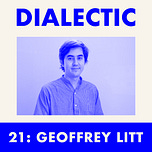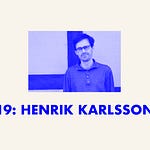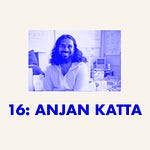Well, I guess that’s it! I’m a 1%er, so no need for any more podcasts. Back to fairly inconsistent updates sharing favorite recommendations…
I kid. I do hope to have more recs for you (here’s one since I brought it up, enjoy), from time to time. But for now, Dialectic remains the focus. I’ll be honest, I haven’t had something to put this much creative energy into in a long time.
Speaking of recs, I recently met Billy Oppenheimer, who I’ve long admired for his excellent newsletter, Six at 6 on Sunday, as well as his research work with Ryan Holiday and others. We recently met for the first time, and had a fun, incredibly long coffee chat about many things. In his recent letter, he wrote about part of our conversation and my reflection on my journey of exploration and gradual progress toward making contact with reality (influenced greatly by
(Dialectic episode here). Billy:Make Contact With Reality
After a successful departure from a company he helped start four years earlier, Jackson Dahl started thinking about what he might want to do next. A week passed. Then a month. Then a year. And what started as a brief break unintentionally became a year-and-a-half-long sabbatical, mostly spent trying to think up a fully formed, beautiful, and coherent future. But around the 18-month mark, rather than looking forward, he began to think back. To the things that had previously gone well in his life. He thought about how he came to co-found that company. He thought about how he came to work the job he had loved before that. He thought about how his friends became his friends, how his favorite books became his favorite books, how his interests became his interests. The further he went to understand the actual process which had led to some of the best things in his life, the more he realized it was a process, a budding, a flowering, an unpredictable, unquenchable unfolding. They weren’t abstractly conceived or predetermined. Instead, they were products of, Jackson once told me, “making contact with reality.” Doing things. Trying things. Bumping up against things, paying attention to what felt alive, and iterating in that direction. “One metaphor I use when I think back on that period of trying to think my way into the perfect next move,” he said, “is it’s like I was holding a seed, desperately trying to determine what exactly the seed was going to grow into without ever actually planting it in soil and watering it.” Today, he said, “I’m not completely out of the woods yet, but I’m making progress. Before, as a mentor once told me, I was planning a roadtrip to Disney World and obsessing over perfecting turns one, two, three, and four, before even getting into the car. Now, I’m in the car and on the way.”
Dialectic has been quite the seed, and an incredible gift. I’m eager to watch it continue to grow.
Thank you for supporting me in the process, and for reading, listening, and sharing your thoughts on it. I’d like to say it’s been purely autotelic—just for me—but the encouragement from many friends and strangers has kept me going.
P.S. I’m experimenting with more social content for Dialectic. You can follow on X here, and check out the latest thread of key ideas from last week with Yancey here.
Dialectic Ep. 21: Geoffrey Litt - Software You Can Shape
Dialectic Episode 21: Geoffrey Litt - Software You Can Shape - is available on Spotify, Apple Podcasts, and YouTube, and all podcast platforms.
Geoffrey Litt (Website, X) is a designer, engineer, writer, and researcher at Ink & Switch, where he champions malleable software: the idea that ordinary people should be able to mold the digital tools they rely on every day.
Ink & Switch is an independent research lab focused on how computers can help us think and work. While researching and writing, Geoffrey and team also build products and prototypes to explore how their ideas can exist in practice. Geoffrey got his PhD at MIT CSAIL, where he built on his inspiration around computational media like spreadsheets, hoping to push more software toward the ethos of end-user programming, but without the technical complexity. In a sense, why should using software and changing it be any different? Previously, he built software for teachers at Panorama Education, which he joined out of school as one of the first employees.
Geoffrey and collaborators recently published a definitive piece on malleable software and we discussed it in detail. We dig into why most modern apps feel like sealed boxes rather than flexible tools and environments, and what changes when your app, document, or workspace, feels more like Lego than machinery. Geoffrey makes his case that we want software tooling to feel like a chef knife, not an avocado slicer, and we talk about how the best designed tools help users up a smooth slope of learning and ability. He argues in favor of deeper understanding, illustrated by one of my favorite ideas: The Nightmare Bicycle. We talk about how LLMs are enabling malleable software and how local tinkerers might be able to build systems for themselves and their team or communities that understand their needs more deeply than any professional designer could. Finally, Geoffrey lays out a call to arms for founders: build products that treat users as co-authors who understand their own needs, not just consumers.
On one level, this is a conversation about software and design. But it is really about agency. I hope it inspires you to pop open the hood on various aspects of your life, look at what's inside, and trust yourself to tinker. As Steve Jobs said many years ago, "the minute you can understand that you can poke life, and if you push in, then something will pop out the other side; that you can change it, you can mold it—that's maybe the most important thing."
This episode is brought to you by Hampton, a private, highly vetted membership for founders. Hampton surveyed over 100 members with net worths of $1M-100M to create its 2024 Wealth Report. They asked about financial goals, spending habits, how much founders themselves, investment portfolio breakdowns, risk tolerance, estate planning and philanthropy, and more. Visit https://joinhampton.com/community to access the report.
Timestamps
0:00:23: Agency in a Digital World and Geoffrey's Creative Medium: Software
0:10:29: Intro to Malleable Software
0:18:54: "Popping Open the Hood" & The Nightmare Bicycle: A Case for Understanding How Systems Work
0:25:59: Computational Media, Spreadsheets, and Digital Informality
0:32:13: Legos and Home Cooking as Metaphors for Software
0:40:42: Two Types of Malleable Software: Modular-by-Design and Hacking
0:46:47: Hampton
0:48:25: Designing for a Smooth Slope
0:56:32: Unbundling Apps into Environments and Tools
1:16:10: Why Do the Work at All When AI Can Do It? When Should We be in the Details?
1:27:34: Empathy & Design: Enabling "Local Developers" Who Know Their and Their Community's Needs
1:36:35: A Case for Optimism About Human Agency
1:49:21: AI's Impact on Malleable Software
1:57:15: Commercial Incentives and Ecosystem Change
2:02:29: Research and Ink & Switch
2:09:58: ChatGPT as a Muse
2:13:46: Working at MUBI and Solving the "Too Many Things to Watch" Problem
2:16:39: Japan's Culture of Care
2:20:27: Mastery and Variety
2:22:46: Joy and Clarity as a Parent
2:23:41: Expressing Care Through What we Make
Links & References
Stewart Brand, working in a shipping container - Austin Kleon
12. Che-Wei Wang & Taylor Levy (CW&T) - Iterating Together with Time - Dialectic
Geoffrey's PHD Thesis: Building Personal Software with Reactive Databases - MIT
Your pie doesn't need to be original (unless you claim it so) - Geoffrey Litt
Browser extensions are underrated: the promise of hackable software - Geoffrey Litt
Project Cambria: Translate your data with lenses (Ink & Switch)
Triggers and Barriers to Customizing Software - Wendy Mackay
Put-that-there - Chris Schmandt, Richard A. Bolt - MIT Media Lab
AI-generated tools can make programming more fun - Geoffrey Litt
Is Mubi Worth $1 Billion? How the Streamer Is Taking on A24 and Neon - Variety
What a School Performance Shows Us About Japanese Education - The New York Times
Dialectic with Jackson Dahl is available on all podcast platforms.
Join the telegram channel for Dialectic
Follow Dialectic on Twitter
Follow Dialectic on Instagram
Subscribe to Dialectic on Spotify
Subscribe to Dialectic on Apple Podcasts
Subscribe to Dialectic on YouTube















Share this post